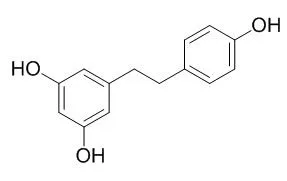| Description: |
Dihydroresveratrol has antiproliferative activity against human prostate cancer PC3 cell line in vitro, it can ameliorate acute pancreatitis-associated lung injury via an inhibitory modulation of pro-inflammatory response, which is associated with a suppression of the NF-κB signaling pathway. |
| Targets: |
p38MAPK | PI3K | NADPH-oxidase | NF-kB | Serine kinase | Threonin kinase |
| In vitro: |
| Age (Dordr). 2011 Dec;33(4):555-64. | | Resveratrol, but not dihydroresveratrol, induces premature senescence in primary human fibroblasts.[Pubmed: 21318333] |
Resveratrol, trans-3,5,4'-trihydroxystilbene, is a polyphenolic compound which has been reported to mimic the gene expression patterns seen in whole animals undergoing dietary restriction. The mechanism of action of resveratrol remains poorly understood, but modulation of both cellular proliferation and apoptosis has been proposed as important routes by which the molecule may exert its effects. This study reports the effects of both resveratrol and Dihydroresveratrol (a primary in vivo metabolite) on the proliferative capacity of human primary fibroblasts.
METHODS AND RESULTS:
No generalised reduction in the growth fraction was observed when fibroblasts derived from three different tissues were treated with resveratrol at concentrations of 10 μm or less. However, concentrations above 25 μm produced a dose-dependent reduction in proliferation. This loss of the growth fraction was paralleled by an increase in the senescent fraction as determined by staining for senescence associated beta galactosidase and dose recovery studies conducted over a 7-day period. Entry into senescence in response to treatment with resveratrol could be blocked by a 30-min preincubation with the p38 MAP kinase inhibitor SB203580.
No effects on proliferation were observed when cells were treated with Dihydroresveratrol at concentrations of up to 100 μm. |
|
| In vivo: |
| Sci Rep. 2016 Mar 14;6:22859. | | Inhibition of pancreatic oxidative damage by stilbene derivative dihydro-resveratrol: implication for treatment of acute pancreatitis.[Pubmed: 26971398] | Trans-resveratrol is a natural stilbenoid possessing multifarious pharmacological benefits; however, when orally consumed, it is rapidly metabolised by colonic microflora and converted to Dihydroresveratrol. Thus, this microbial metabolite is of great therapeutic relevance.
METHODS AND RESULTS:
In the present study, upon the oral administration of Dihydroresveratrol (10-50 mg/kg), the severity of acute pancreatitis in the cerulein-treated rats was significantly ameliorated as evidenced by decreased α-amylase activities in the plasma and lessened oedema formation in the pancreatic parenchyma. In addition, the generation of intracellular reactive oxidative products, including malondialdehyde and protein carbonyls, was accordingly reduced, so as the production of pro-inflammatory cytokines. While inhibiting the activities of NADPH oxidase and myeloperoxidase, the depletion of glutathione was considerably restored. Importantly, the attenuation of pancreatic oxidative damage by Dihydroresveratrol was associated with a down-regulation of the nuclear factor-kappaB and phosphatidylinositol 3'-kinase-serine/threonine kinase signalling pathways. Furthermore, we demonstrated that the solubility of Dihydroresveratrol was at least 5 times higher than trans-resveratrol whilst exhibiting a much lower cytotoxicity.
CONCLUSIONS:
Collectively, the current findings accentuate new mechanistic insight of Dihydroresveratrol in pancreatic oxidative damage, and advocate its therapeutic potential for the management of acute pancreatitis, particularly for patients unresponsive to trans-resveratrol due to the lack of proper microbial strains. |
|






 Cell. 2018 Jan 11;172(1-2):249-261.e12. doi: 10.1016/j.cell.2017.12.019.IF=36.216(2019)
Cell. 2018 Jan 11;172(1-2):249-261.e12. doi: 10.1016/j.cell.2017.12.019.IF=36.216(2019) Cell Metab. 2020 Mar 3;31(3):534-548.e5. doi: 10.1016/j.cmet.2020.01.002.IF=22.415(2019)
Cell Metab. 2020 Mar 3;31(3):534-548.e5. doi: 10.1016/j.cmet.2020.01.002.IF=22.415(2019) Mol Cell. 2017 Nov 16;68(4):673-685.e6. doi: 10.1016/j.molcel.2017.10.022.IF=14.548(2019)
Mol Cell. 2017 Nov 16;68(4):673-685.e6. doi: 10.1016/j.molcel.2017.10.022.IF=14.548(2019)